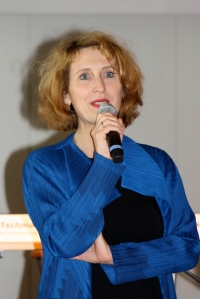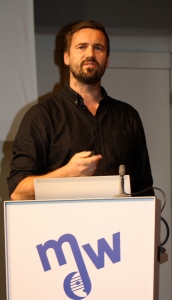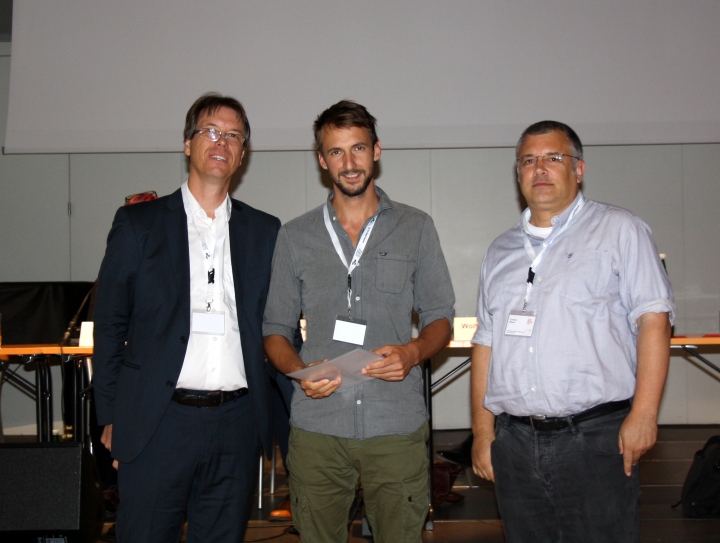 The 8th Vienna Music Business Research Days on “Unchaining the Digital Music Business?” were held at the University of Music and Performing Arts Vienna from September 12-14, 2017. Over the past few years new gatekeeping processes in the digital music business have emerged and international music business experts, therefore, highlighted the role of new and old gatekeepers as well as the impact of innovative technologies such as the blockchain on structures and processes in the music business.
The 8th Vienna Music Business Research Days on “Unchaining the Digital Music Business?” were held at the University of Music and Performing Arts Vienna from September 12-14, 2017. Over the past few years new gatekeeping processes in the digital music business have emerged and international music business experts, therefore, highlighted the role of new and old gatekeepers as well as the impact of innovative technologies such as the blockchain on structures and processes in the music business.
Students from Austria, Bardados, Canada, Germany, Serbia and South Africa on a master and PhD level opened the conference with the Young Scholars Workshop presenting and discussing their research findings with reknown academics in the field of music business research (workshop program). The article “Virtual Songwriting: Fostering Creative Processes through ‘Challenge’ and ‘Collaboration'” by Benjamin Schiemer from the Johannes Kepler University Linz in Austria was awarded by an international jury as best paper and is considered to be published in the International Journal of Music Business Research (IJMBR).
Music business researchers from Austria, Australia, Finland, Germany, Italy, Norway, Spain, United Kingdom and the US gathered on the conference track day (September 13) to present their recent findings on the music business and discuss them with the audience. The topics ranged from the economics of music festivals, music piracy, regulatory aspects in the music business and on choreographies to artist-fan engagement, music management, social media in the music business to the impact of blockchain technology on the music industry (see program).
The invited conference day on September 14 highlighted the role of new gatekeepig processes in the digital music bsuines by new and old players of the music industry. Daniel Nordgård from the University of Agder in Kristiansand/Norway held the introductory talk on “New Gatekeeping Processes in the Digital Music Business” and moderated then a panel discussion with Sally Gross (University of Westminster, London), Sarita Stewart (Mike Curb College of Entertainment & Music Business, Belmont University Nashville/USA), Scott Cohen (The Orchard, London and New York) and Stefan Baumschlager (Record Bird, Vienna). In the following presentation George Musgrave from the University of Westminster in London talked on “Control and Autonomy in the Digital Music Business”.
In the afternoon Alan Graham and Wolfgang Senges critically reflected in two keynotes – “The Applications of Blockchain Technology in the Music Business” and “The Benefits and Challenges of Blockchain Technology in the Music Business” the current hype about blockchain technology and discussed with Carlotta de Ninni (Mycelia for Music project) and Kelly Snook (University of Brighton) its impact on the music business.
8th Vienna Music Business Research Days on
Unchaining the Digital Music Business?
CONFERENCE TRACK DAY ON SEPTEMBER 13, 2017 (program as pdf)
Brown, Steven C. (University of Strathclyde, Glasgow, UK) & Krause, Amanda E. (University of Melbourne, Australia): Illegal music downloading: A psychologist tells some tales (presentation)
Burchard, Jason (London School of Economics and Political Science, UK): Conceptualizing an entrepreneurial growth model of the 21st century music industry (full paper, presentation, audio stream)
Carugno, Giovanna (University of Campania Luigi Vanvitelli, Italy): Copyright protection and choreographies: New issues, old solutions? (presentation)
Flath, Beate (University of Paderborn, Germany): Festivals in rural regions: An empirical study on value creation processes through the example of the Orange Blossom Special Festival (OBS)
Karjalainen, Toni-Matti (Aalto University School of Business, Helsinki, Finland): Distributed team leadership in a rock band – curing the discordant alliance of creativity and business? (presentation)
Lenten, Liam (La Trope University Melbourne, Australia) & McKenzie, Jordi (Macquarie University Sydney, Australia): “The times they are a-changin’”: On the ephemeral nature of music polls (presentation & audio stream)
Marshall, Lee & Haynes, Jo (University of Bristol, UK): Beats and tweets: Social media in the careers of independent musicians (presentation & audio stream)
Montoro-Pons, Juan D. & Cuadrado-García, Manuel (University of Valencia, Spain): Assessing the impact of headlining a music festival
Morrow, Guy (University of Melbourne, Australia): Agile management strategies within the music industries: Artist management and the problem of creative labour (presentation)
Prey, Robert (University of Groningen, The Netherlands): The quantified artist: The musician after datafication (audio stream)
Quack, Sigrid & Hondros, Konstantin (University of Duisburg-Essen, Germany): Transforming regulatory uncertainty in musical creativity? Legal professionals’ practices in the music business (presentation)
Senges, Wolfgang (ContentSphere, Berlin, Germany): Blockchain for music business: Preventing the threat of disruption by transition management (full paper, presentation & audio stream)
Stewart, Sarita M. (Belmont University, Nashville, US): The use of the artist-fan engagement model as a strategy tool (full paper, presentation & audio stream)
Tronvoll, Bård & Haampland, Ola (Inland Norway University of Applied Sciences): Music digital streaming – the formation of listening experience (presentation)
Wiesener, Oliver (Stuttgart Media University, Germany): Gender-specific music preferences at video ads (full paper & presentation)
BOOK PRESENTATION AND PANEL DISCUSSION
“THE ECONOMICS OF MUSIC STREAMING” ON SEPTEMBER 13
 In collaboration with the Austrian Chamber of Commerce and the Viennese Chamber of Commerce, Peter Tschmuck presented his recently published book “The Economics of Music” to the public (presentation slides). In the following panel discussion on “The Economics of Music Streaming – Revenue Streams for Musicians and Music Producers from Spotify & Co.” the former Pink Floyd manager Peter Jenner (Sincere Management, London), Sally Gross (University of Westminster, London), Hannes Tschürtz (ink music, Vienna) and Alexander Hirschenhauser (VTMÖ – Austrian indie label association, Vienna)
In collaboration with the Austrian Chamber of Commerce and the Viennese Chamber of Commerce, Peter Tschmuck presented his recently published book “The Economics of Music” to the public (presentation slides). In the following panel discussion on “The Economics of Music Streaming – Revenue Streams for Musicians and Music Producers from Spotify & Co.” the former Pink Floyd manager Peter Jenner (Sincere Management, London), Sally Gross (University of Westminster, London), Hannes Tschürtz (ink music, Vienna) and Alexander Hirschenhauser (VTMÖ – Austrian indie label association, Vienna)
 (from left to right: Peter Tschmuck, Peter Jenner, Sally Gross, Alexander Hirschenhauser, Hannes Tschürtz)
(from left to right: Peter Tschmuck, Peter Jenner, Sally Gross, Alexander Hirschenhauser, Hannes Tschürtz)
INVITED CONFERENCE DAY ON
“UNCHAINING THE DIGITAL MUSIC BUSINESS?” ON SEPTEMBER 14, 2017
 Ulrike Sych, the Rector of University of Music and Performing Arts Vienna, opened the third conference day on “Unchaining the Digital Music Business?” by welcoming our international guests and the local audience.
Ulrike Sych, the Rector of University of Music and Performing Arts Vienna, opened the third conference day on “Unchaining the Digital Music Business?” by welcoming our international guests and the local audience.
 Daniel Nordgård from the University of Agder in Kristiansand/Norway held the introductory talk on “New Gatekeping Processes in the Digital Music Business”. He outlined at the beginning of his talk that gatekeeping is a difficult term that is used in many different settings, and have a wide range of connotations and values added to it. Thus, he focused on two aspects of gatekeeping: (1) as an entry point to an industry or market and (2) as providing access to an audience. In that respect gatekeeping processes can create new types of experiences. Initially the recorded music labels were the entry point in the recording industry. They controlled the access to sound studios, manufacturing facilities, marketing efforts and distributions channels. As a result the consumers could only choose from a pre-selected supply. For some years it was a consensus among researchers that digital change diminished the record companies to mere distribution-systems which were deemed to be outdated and replaceable. In her book “Blockbusters”, however, Anita Elberse highlights that the “iron law of distribution” dictates that no function simply disappear, but must be taken by someone else. Although the traditional gatekeeping function in the recorded music industry disappeared new gatekeeping processes emerged. As Ursula Huws put it: “It’s easy to get in, but hard to get on!” By referring to Schwartz’ bestseller “The Paradox of Choice”, Nordgård that more supply with music does not automatically implies a greater choice. However, marketing efforts e.g. by playlist curating have become pivotal in the digital music industry. Playlists are therefore no entry points into the recorded music market. New gatekeeping in the digital music business thus relies on controlling attention in a noisy digital environment with an oversupply of music.
Daniel Nordgård from the University of Agder in Kristiansand/Norway held the introductory talk on “New Gatekeping Processes in the Digital Music Business”. He outlined at the beginning of his talk that gatekeeping is a difficult term that is used in many different settings, and have a wide range of connotations and values added to it. Thus, he focused on two aspects of gatekeeping: (1) as an entry point to an industry or market and (2) as providing access to an audience. In that respect gatekeeping processes can create new types of experiences. Initially the recorded music labels were the entry point in the recording industry. They controlled the access to sound studios, manufacturing facilities, marketing efforts and distributions channels. As a result the consumers could only choose from a pre-selected supply. For some years it was a consensus among researchers that digital change diminished the record companies to mere distribution-systems which were deemed to be outdated and replaceable. In her book “Blockbusters”, however, Anita Elberse highlights that the “iron law of distribution” dictates that no function simply disappear, but must be taken by someone else. Although the traditional gatekeeping function in the recorded music industry disappeared new gatekeeping processes emerged. As Ursula Huws put it: “It’s easy to get in, but hard to get on!” By referring to Schwartz’ bestseller “The Paradox of Choice”, Nordgård that more supply with music does not automatically implies a greater choice. However, marketing efforts e.g. by playlist curating have become pivotal in the digital music industry. Playlists are therefore no entry points into the recorded music market. New gatekeeping in the digital music business thus relies on controlling attention in a noisy digital environment with an oversupply of music.
Video stream and presentation slides
 (from left to the right: Stefan Baumschlager, Sally Gross, Scott Cohen, Sarita Stewart, Daniel Nordgård)
(from left to the right: Stefan Baumschlager, Sally Gross, Scott Cohen, Sarita Stewart, Daniel Nordgård)
In the following Daniel Nordgård moderated the very entertaining panel discussion on the same topic with Sally Gross (University of Westminster, London), Sarita Stewart (Mike Curb College of Entertainment & Music Business, Belmont University Nashville/USA), Scott Cohen (The Orchard, London and New York) and Stefan Baumschlager (Record Bird, Vienna). The discussion started with an argument on whether the (recorded) music industry was broken in the process of digitization. Whereas Scott Cohen did not see any disruption that has blown away the “old” gatekeepers, Stefan Baumschlager identified a shift in gatekeping to new players such as tech companies. He argues that fans don’t see all the music they would like to see on facebook but also on other social media portals. And if you consider the power of playlists they are the new bootlenecks in the business. Scott Cohen agreed and emphazised that algorithms are the new and controversial gatekeepers in the music industry that are as important as humans in the past. Sally Gross and Sarita Stewart, however, warned not to overemphazise the role of algorithms, but to take the human factor still in consideration e.g. as human curation of playlists. In the discussion with the floor it was highlighted that if you look at the ownership of music companies and music promoters and music festivals you can see the new gatekeping power at work. And another contribution from the floor pointed at the influence of copyright regulations on our culture and how culture evolves (or is allowed to evolve).
 In his talk on “Control and Autonomy in the Digital Music Business”, George Musgrave initially highlighted different concepts of autonomy and then pointed at the paradox that musicians feel autonomy without having control in a digital music environment. Therefore, he highlights in a case study a London rap artist who does not just write and record the music by his own, but even shots all the music videos by himself without any support and promotes his music by self-made social media campaigns. Thus, technological means helps artists to become more autonomous in the production process, but that does not mean that they become autonomous entrepreneurs too, since this also involves the ability to control their careers and future success. In a hypercompetetive environment such as the recorded music market, careers are increasingly collective and at the same time the power of gatekeepers increases. Hence, independency claims to be a myth. Musgrave concluded that the tension between autonomy and control can be the source for anxiety and depressions which might also lead to physical illness as he observed in a ongoing research project at the University of Westminster.
In his talk on “Control and Autonomy in the Digital Music Business”, George Musgrave initially highlighted different concepts of autonomy and then pointed at the paradox that musicians feel autonomy without having control in a digital music environment. Therefore, he highlights in a case study a London rap artist who does not just write and record the music by his own, but even shots all the music videos by himself without any support and promotes his music by self-made social media campaigns. Thus, technological means helps artists to become more autonomous in the production process, but that does not mean that they become autonomous entrepreneurs too, since this also involves the ability to control their careers and future success. In a hypercompetetive environment such as the recorded music market, careers are increasingly collective and at the same time the power of gatekeepers increases. Hence, independency claims to be a myth. Musgrave concluded that the tension between autonomy and control can be the source for anxiety and depressions which might also lead to physical illness as he observed in a ongoing research project at the University of Westminster.
 After the lunch break Alan Graham who co-founded OneClickLicence (OCL) critically discussed the blockchain hype by stating that the high expectations cannot possibly be met, escpecially in the field of music. Not the blockchain, but the ideas inside blockchain – decentralization and transparency – will change everything. Thus, he refers to his company OCL that provides a new concept of user focused music licensing that is not to be based on the blockchain technology but on the fundamental ideas of the blockchain. Nevertheless the standardisation and licensing of music remains the key problem for all solutions if they based on the blockchain or not. Thus, a question from the floor opened the discussion on how the music industry can be brought on board? It was a consensus among the discussants that metadata on copyrights and ownership must be included in a blockchain based application, but that can only be accomplished by regulatory efforts by governments. The fair distribution of money in the music industry, thus, cannot be solved by technology alone but by policy efforts to support the artists.
After the lunch break Alan Graham who co-founded OneClickLicence (OCL) critically discussed the blockchain hype by stating that the high expectations cannot possibly be met, escpecially in the field of music. Not the blockchain, but the ideas inside blockchain – decentralization and transparency – will change everything. Thus, he refers to his company OCL that provides a new concept of user focused music licensing that is not to be based on the blockchain technology but on the fundamental ideas of the blockchain. Nevertheless the standardisation and licensing of music remains the key problem for all solutions if they based on the blockchain or not. Thus, a question from the floor opened the discussion on how the music industry can be brought on board? It was a consensus among the discussants that metadata on copyrights and ownership must be included in a blockchain based application, but that can only be accomplished by regulatory efforts by governments. The fair distribution of money in the music industry, thus, cannot be solved by technology alone but by policy efforts to support the artists.
 In a second keynote, Wolfgang Senges of the Berlin-based ContentSphere consulting company spoke about “The Benefits and Challenges of Blockchain Technology in the Music Business”. He addressed several benefits connected with the blockchain that has also a flipside.
In a second keynote, Wolfgang Senges of the Berlin-based ContentSphere consulting company spoke about “The Benefits and Challenges of Blockchain Technology in the Music Business”. He addressed several benefits connected with the blockchain that has also a flipside.
What’s in for the music business?
The blockchain, thus, allows artists to see real-time accounts, showing the current revenue streams. It provides a comfortable transaction system to help for a fair remuneration. It also provides working history that may serve as “legal assurance”. The blockchain allows to engage in shared creation where splits are supported. And the equal access to the market is possible for all creatives. The PROs could cut transaction & administration costs and a new individualised tariff regime could be build on smart contracts. In general licensing may become more efficient thanks to automation & usability and the awkward task of keeping metadata clean can be managed much more efficiently and successfully.
What are the challenges for the music business?
To implement a useful blockchain application you have to get all stakeholders at one table that have divergent interests and follow contradicting strategies. Licensing is a at the heart of the music business, but licensing means metadata. Metadata, however, is often missing and even incorrect. This problem cannot be solved by blockchain technology, but has to solved before useful blockchain applications are developed. Blockchain technology can also be considered by music industry players as a further dispution threating their business models. Therefore, the implementation of the blockchain in the music industry must be accompanied by transition management.
Wolfgang Senges concluded by drawing two extremes: (1) Blockchain provides equal access to the market for all artists. There is no threat of disruption and the problem with metadata can be solved; (2) a mega-P2P file-sharing network emerges that cannot be sued and is protected by cryptographic methods. In such a scenario the basics of music industry as we know it can be destroyed. The realitity will be somewhere in between these extremes.
Video stream and presentation slides
After the panel discussion Carsten Winter and Peter Tschmuck announced the winner of the best paper presented in the Young Scholars’ Workshop. Benjamin Schiemer from the Johannes Kepler University Linz in Austria was awarded best paper for “Virtual Songwriting: Fostering Creative Processes through ‘Challenge’ and ‘Collaboration'”. The winner’s paper is considered to be published in the International Journal of Music Business Research.
 (from left to the right: Peter Tschmuck, Benjamin Schiemer, Carsten Winter)
(from left to the right: Peter Tschmuck, Benjamin Schiemer, Carsten Winter)
All photos (c) by Magdaléna Tschmuck
Media response
Belmont University News & Media, “Stewart Presents Paper at Vienna Music Business Research Conference”, September 26, 2017.
Ö1 Digital.Leben, “MusikerInnen und Spotify”, September 14, 2017.
Ö1 Morgenjournal, “Woher kommen Erlöse für Musiker?“, September 14, 2017.
Salzburger Nachrichten, “Eine digitale Kette wirkt befreiend”, September 25, 2017.
Tiroler Tageszeitung, “Streaming ist nicht mehr wegzudenken“, September 16, 2017.
Vienna.at, “Tagung zu Innovationen im Musikbusiness in Wien“, September 8, 2017.
New Sound, “Unchaining the Digital Music Business? 8th Vienna Music Business Research Days (September 12 to 14, 2017)” review by Marija Maglov, vol. 50/II December 2017.

One thought on “The 8th Vienna Music Business Research Days in Retrospective”